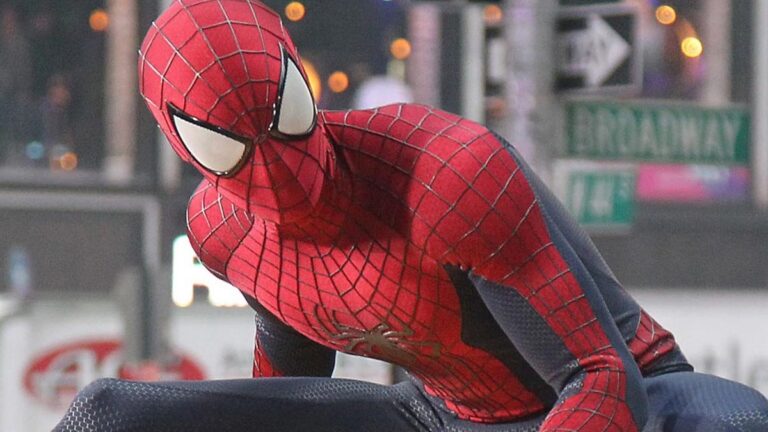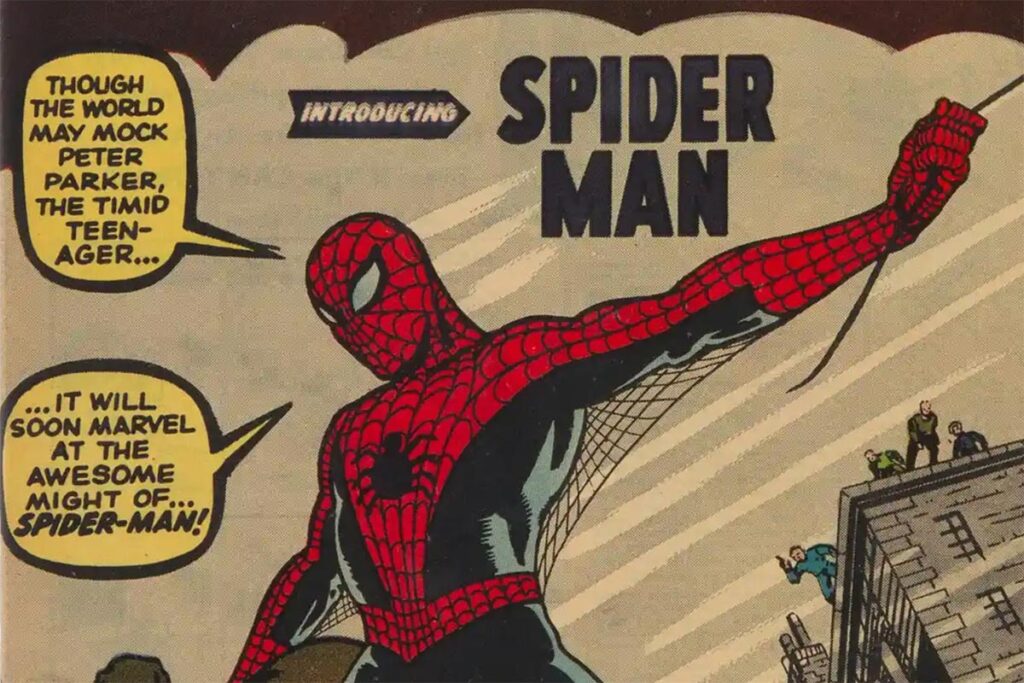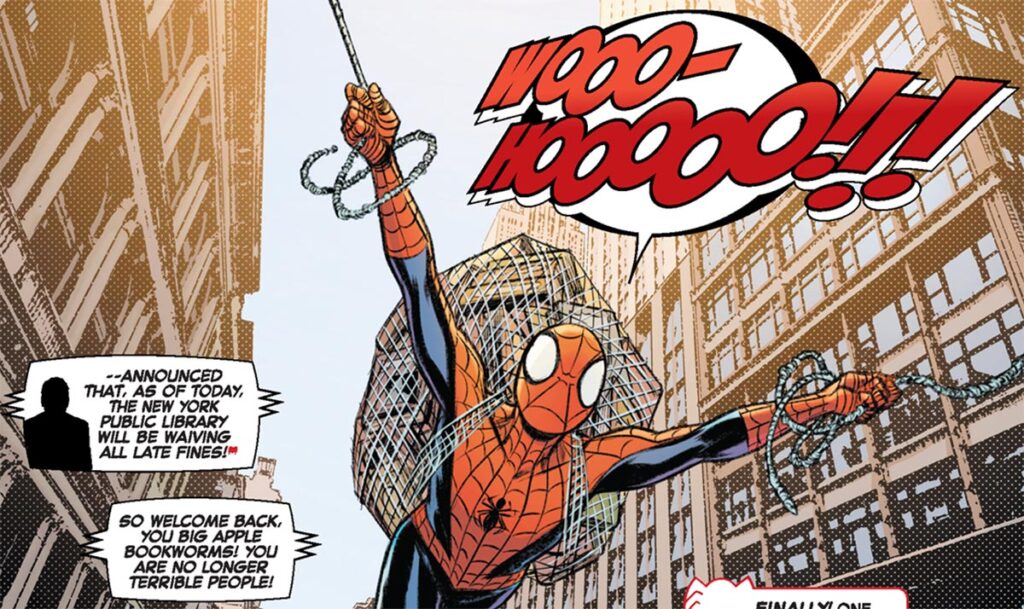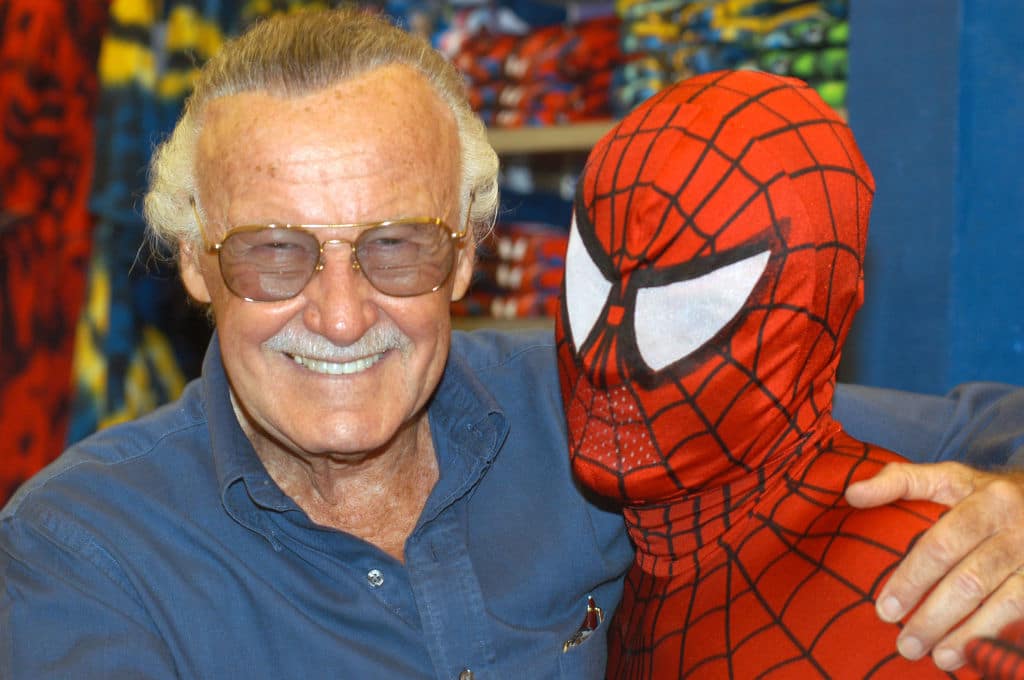
With the release of “Spider-Man: Across the Spider-Verse” earlier this month, audiences were treated to a kaleidoscope of Spider-characters from various realities.
While the protagonist of the film, Miles Morales, is Christian, the religion of the original Spidey, Peter Parker, has sparked a heated debate.
Although Peter Parker’s religion has never been officially confirmed, several instances suggest he could be Jewish, but does that make everyone’s friendly neighborhood Spider-Man a part of the tribe?
Spider-Man’s comic portrayals are inspired by Jewish values — not a clear-cut identity
While there are signs that point to Spider-Man having a Jewish identity, there isn’t any concrete proof in his comic books.

In fact, numerous Christmas stories feature Spider-Man, and while he often wishes Jewish audiences a happy Hanukkah in those stories, none are specifically about Hanukkah.
Stan Lee, Spider-Man’s Jewish creator, reportedly never intended the superhero to be explicitly Jewish. Instead, he was simply inspired by the complex biblical character of King David.
Spider-Man, like many of the characters Lee created, never asked for powers — instead, they were thrust upon him. He, like David, was forced into a higher calling by the gifts granted to him.
Lee wanted to infuse Spider-Man with what he saw as the essence of Jewish values: “To me you can wrap all of Judaism up in one sentence, and that is, ‘do not do onto others.’ All I tried to do in my stories was show that there’s some innate goodness in the human condition.”
Being a superhero inherently involves doing good deeds and averting harm — core principles that, for Lee and Hillel, encapsulate Judaism. Guided by this ethos, Peter Parker decides he wants to be a superhero to stop crimes, spurred by the tragic death of his uncle Ben, and commits his life to preventing harm.

This theme has resonated across the Spider-Man franchise, from Peter Parker’s endeavors to reform his adversaries in “Spider-Man: No Way Home” to Miles Morales’ risky efforts to save his father despite the possible repercussions for himself, in the latest “Spider-Verse” flick.
While Peter Parker lives in Forest Hills, Queens — a New York City neighborhood with a large Jewish population — that doesn’t necessarily mean that he is a member of the tribe.
However, his one-liners and jokes were inspired by Jewish humor as they are self-deprecating and often mask pain. “He’s a very funny guy, almost Seinfeld with webbing,” Marvel writer Danny Fingeroth said.
Brian Michael Bendis, author of the “Ultimate Spider-Man” series, said that Peter Parker’s character is a reflection of Stan Lee himself, which could substantiate the claim of Peter Parker’s Jewishness.
“I joked about this for years but I still think that Peter Parker is a Jewish character. After reading Danny Fingeroth’s excellent book on Stan Lee and hearing about his time working for his uncle in New York City in publishing at 16, it’s hard not to see Stanley Lieber writing himself as Peter Parker,” Bendis said.
The crew and casts behind Spider-Man films have declared him canonically Jewish

While the comic books subtly hint at Jewish influences, the filmmakers behind the Spider-Man movies have gone further to name Peter Parker as a Jewish character.
Avi Arad, the Jewish executive producer of the films, has asserted that Tobey Maguire’s Spider-Man was intended to be Jewish, saying that the Parker family “are practically shtetl Jews living in Queens.”
Similarly, Sam Raimi, the Jewish director of Maguire’s trilogy, backed up this interpretation, noting that his character embodies Jewish themes.
“Spider-Man is a character that spends his life trying to pay down his guilt,” Raimi said. “That’s a real classically Jewish quality — to be very aware of your sins in this life and try to make amends for them in this life.”
Every Spider-Man iteration grapples with grief and guilt linked to the deaths of Uncle Ben and his girlfriend Gwen Stacy. Jewish guilt, a key aspect of Judaism where individuals are expected to right their wrongs and apologize for their actions, especially during Yom Kippur, is therefore integral to Spider-Man’s narrative.
Judaism emphasizes the importance of acknowledging and rectifying wrongs, a principle called teshuvah that can resonate with all individuals, superhero or not.
In “Spider-Man: Across the Spider-Verse,” the protagonist, Miles Morales, learns that coping with guilt over inadvertently causing harm or death is a “canon event” for all Spider-Men; in every universe, this experience must occur. Morales is told that his guilt and grief are pivotal to his evolution into a force for good.
Michael Chabon, the Jewish writer of “Spider-Man 2,” released in 2004, originally coined Peter Parker a crypto-Jew, a term referring to someone who conceals their Jewish faith and practices due to external pressures or constraints, while publicly presenting a different religious or secular identity.
Meanwhile, in “The Amazing Spider-Man” franchise, Jewish actor Andrew Garfield proudly declared that his version of the web-slinging superhero is a member of the Jewish Spider-Verse.
He said that Peter Parker’s defining feature was his Jewishness, highlighting traits like self-doubt and neurosis.
The 2018 film “Spider-Man: Into the Spider-Verse,” features Peter B. Parker — voiced by Jewish actor Jake Johnson and modeled after Maguire’s Spider-Man — stepping on a glass during his wedding to Mary Jane Watson. This act is a nod to the Jewish wedding tradition.
“I had my own personal theory and I was a real loudmouth about it,” “Spider-Verse” co-director Rodney Rothman explained. “I was mainly just messing with people, but I would say, ‘You know Spider-Man is Jewish, right?’ I was like, ‘His name is ‘Spider-Man,’ reminiscent of many Ashkenazi surnames.”
Was Spider-Man creator Stan Lee Jewish?

Stan Lee, born Stanley Martin Lieber, was born on Dec. 28, 1922, to Romanian Jewish parents Celia and Jack Lieber. The couple had fled to the United States due to antisemitism in their home country.
Growing up, Lee’s mother lit Shabbat candles and his father loved attending synagogue. However, Stan’s relationship with Judaism was more complicated — he did not attend Hebrew school and said he only had a bar mitzvah to please his father.
According to Abraham Riesman, author of “The True Believer: The Rise and Fall of Stan Lee,” the Spider-Man creator’s connection with Judaism was strained.
His father, Jack Lieber, was particularly devoted to his Jewish identity, shaped by his personal experiences with antisemitism in Romania during the late 19th and early 20th centuries. Jack was known for his stern demeanor and often expressed disappointment in Stan’s lack of connection with the Jewish community and culture.
In his later years, Lee did not publicly identify as Jewish. Riesman said that Lee would get letters from his father urging him to use his influential position and wealth to support the Jewish people and Israel.
Lee passed away on Nov. 12, 2018, at 95. His final published work was an introduction to “We Spoke Out: Comic Books and the Holocaust,” in which he expressed pride in the role comic books played in educating young readers about the Holocaust.
“For more than a few young people, a story in a comic book was their first exposure to the Holocaust. I take great pride in the role comics creators played in introducing teens to this topic. Educating young people about the Holocaust is crucial to ensuring that such an indescribable atrocity will never be repeated. And there can be no more important mission than that,” Lee wrote.
Stan Lee was among a generation of Jewish leaders in comics
Jewish creators played a significant role in the early 1900s comics industry, often finding themselves marginalized from more prestigious media outlets. Originally seen as a lowbrow form of entertainment intended solely for children, comics provided an opportunity for these Jewish creatives to express themselves and reach a broad audience.
Lee got a job at Timely Comics (later rebranded as Marvel) working under Joe Simon (Hymie Simon) and Jack Kirby (Jacob Kurtzberg), both of whom were Jewish.
His initial role as an assistant eventually led to his first writing assignment for Captain America, a character created by his bosses.
However, Lee harbored ambitions of becoming a novelist and felt a tinge of embarrassment about his comic work. As a result, he adopted the pseudonym ‘Stan Lee’, reserving his birth name, Stanley Lieber, for his anticipated literary career.
Meanwhile, Bob Kane and Bill Finger — Jewish contemporaries of Lee’s from DeWitt Clinton High School in the Bronx — collaborated to create the iconic character Batman at DC Comics.
This dark and complex character added new dimensions to the heroic archetype established by fellow Jewish creators Joe Shuster and Jerry Siegel’s Superman.
In response to DC’s success, Timely Comics’ publisher, Martin Goodman, tasked Lee with developing his own super squad.
Lee sought to subvert the traditional flawless superhero narrative, introducing characters that were imperfect and sometimes failed to stop villains in time. This was practically unheard of in this age of comics where superheroes were perfect and would stop the villain by the end of a book.
Collaborating with Kirby, Lee first created the Fantastic Four, followed by the Hulk, Iron Man, Thor, and the X-Men.
Shortly afterward, Lee teamed up with artist Steve Ditko to bring Spider-Man into existence. Lee and Kirby’s universe expanded to include co-creations like Doctor Strange, Black Panther, Daredevil, Black Widow, and Deadpool, among others, who would ultimately unite as the Avengers.
The comics industry’s Silver Age was substantially shaped by Jewish editors, artists, publishers and writers. Lee and Kirby emerged as two of the most influential figures of this period. With Lee’s passing, some view it as the closing chapter of Jewish creative dominance in the comics industry, marking the end of an era.
Originally Published Jun 21, 2023 03:35PM EDT
